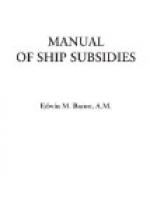The matter was brought up in Congress by a resolution of the House, March 22, 1869, calling for the appointment of a select committee, “to inquire into and report at the next session of Congress the causes of the great reduction of American tonnage engaged in the foreign carrying trade, and the great depression of the navigation interests of the country; and also to report what measures are necessary to increase our ocean tonnage, revive our navigation interests, and regain for our country the position it once had among the nations as a great maritime power.” Of this committee Representative John Lynch of Maine was made chairman.
The committee gave a series of hearings mainly in Atlantic seaboard cities, and submitted their report on February 17, 1870, accompanied by two bills recommended for passage; the one, a bounty bill, the other, relative to tonnage duties. With these measures the history of years of effort to establish the principle of general ship-subsidies in the American economic system properly begins.
The Lynch bounty bill, entitled “An act to revive the navigation and commercial interests of the United States,” made provision for the remission of duties upon the raw materials entering into the construction of sailing and steam-ships; for the taking in bond, free of duty, of all stores used in vessels in sailing to foreign ports; and for bounties, or subsidies, to American sailing and steam-ships engaged in foreign commerce, already built as well as to be built: the aid being extended to those already built because they had been sailed during the Civil War and since “at great disadvantage."[HE] The amount of duties to be remitted was to be equal to the amount per ton collected on the materials required for certain defined classes of ships: on wooden vessels, eight dollars a ton; on iron, twelve dollars a ton; on composite vessels (vessels composed of iron frames and wooden planking), twelve dollars a ton; on iron steamers, fifteen dollars a ton. Where American materials were used in the construction of iron or composite vessels, allowance was to be made of an amount equivalent to the duties imposed on similar articles of foreign manufacture. The bounties were thus classified: to owners of American registered ships engaging for more than six months in a year in the carrying trade between America and foreign ports, or between ports of foreign countries, a dollar and a half per ton upon a sailing-ship each year so engaged, and a dollar and a half upon a steamer running to and from the ports of the British North American provinces; four dollars upon a steamer running to and from any European port; and three dollars to and from all other foreign ports.[HF]




